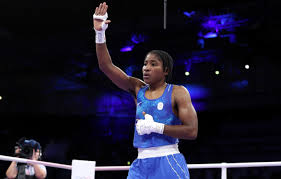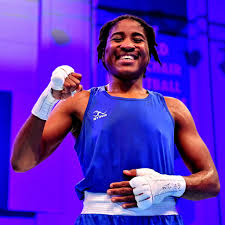Cameroon hasn’t won a single medal in the 2024 Olympics, too bad it ‘kicked out’ a terrific woman boxer because of archaic and insensitive colonial style sexuality laws, Frank Krishner writes.
You have the talent, determination, and grit to reach the pinnacle of your sport, only to have your dreams constantly threatened by something as arbitrary as where you were born.
This is the story of Cindy Winner Djankeu Ngamba, a name that will now go down in history as the first-ever Olympic medalist for the refugee team, a team born out of necessity for athletes who cannot compete under their national flag due to war, persecution, or in Cindy’s case, because of her sexual orientation.
Ngamba’s journey to the Olympic podium is a tale of incredible fortitude. It is a stark reminder of the harsh realities faced by LGBT individuals in countries like Cameroon, where homosexuality is criminalized. Born in Cameroon, Cindy was forced to flee her home country at the age of 11, seeking refuge in Bolton, a town in Greater Manchester, England. Her crime? Being Gay. In Cameroon, she could be to imprisoned, or worse,killed; and returning home has never been an option.
Despite the odds, Cindy has fought her way to the top. She’s trained with Great Britain boxing, claimed three national titles across different weight classes, and yet, she remains in limbo — a refugee in a country that has repeatedly denied her citizenship. Ironic, isn’t it, that someone who has given so much to her adopted home, representing it on the world’s biggest stage, is still not recognised as a British citizen.
But let’s talk about the boxing. Cindy stepped into the ring at the Paris 2024 Olympics as a representative of the refugee team, a squad of 37 athletes from around the world, each with their own story of struggle and courage. She fought her way to the semi-finals of the women’s 75-kilogram boxing competition, securing a bronze medal after a hard-fought match against Panama’s Atheyna Bylon.
Boxing isn’t just about physical strength; it’s about strategy, mental toughness, and heart. Cindy has all three in spades. She went up against Bylon, a taller southpaw, in a match that was as much about positioning and tactics as it was about power. Cindy lost the first round on the judges’ scorecards but came back swinging in the second, earning the majority vote. Though she didn’t advance to the final, her bronze medal win was historic, marking a victory not just for her, but for refugees and LGBT individuals worldwide.
Too bad, Too sad
However, beyond the triumphs in the ring, Cindy’s story sheds light on the deep loss for Cameroon. Here is a nation that has produced a world-class athlete, someone who has proven herself on the global stage, yet she can never return home. Cameroon’s strict anti-LGBT laws have driven away one of their own, a woman who could have inspired countless others, not just in sports, but in life.
Imagine the potential that is lost when a country forces its brightest talents to flee. Cindy is a shining example of what can be achieved when someone is given the opportunity to thrive, regardless of their background or who they love. But Cameroon’s laws have made it clear that there is no place for someone like Cindy within their borders. This is not just a loss for Cindy; it is a loss for Cameroon, a loss for their sports community, and a loss for their society as a whole.
For Cindy, the fight continues outside the ring. She lives with the fear of being detained again, as she was in 2019 during a routine immigration appointment. She trains with Great Britain’s boxing team but doesn’t receive the financial support that comes with citizenship. Her life is one of constant uncertainty, where a knock at the door or a siren in the street could signal the end of the life she has built in the UK.
She’s an Inspiration
Yet, despite all of this, Cindy remains an inspiration. She has never given up, not in the face of adversity, not when denied citizenship, and certainly not in the boxing ring. Her message to refugees and anyone facing insurmountable odds is simple: “Keep on working hard, keep on believing in yourself. You can achieve whatever you put your mind to.”
Cameroon’s loss is the world’s gain. Cindy Ngamba is a testament to the resilience of the human spirit, a beacon of hope for those who are told they do not belong. As she stands on the Olympic podium, refugee flag in hand, she represents not just herself, but all those who have been forced to flee their homes in search of a place where they can be free.
In a just world, Cindy would be celebrated in Cameroon as a national hero. Instead, she must look to the future, to a life where she can live openly and freely, and where her achievements are recognised not just by the world, but by the country she now calls home.
The question remains: how many more Cindy Ngambas must there be before the world realizes that love should never be a crime?



